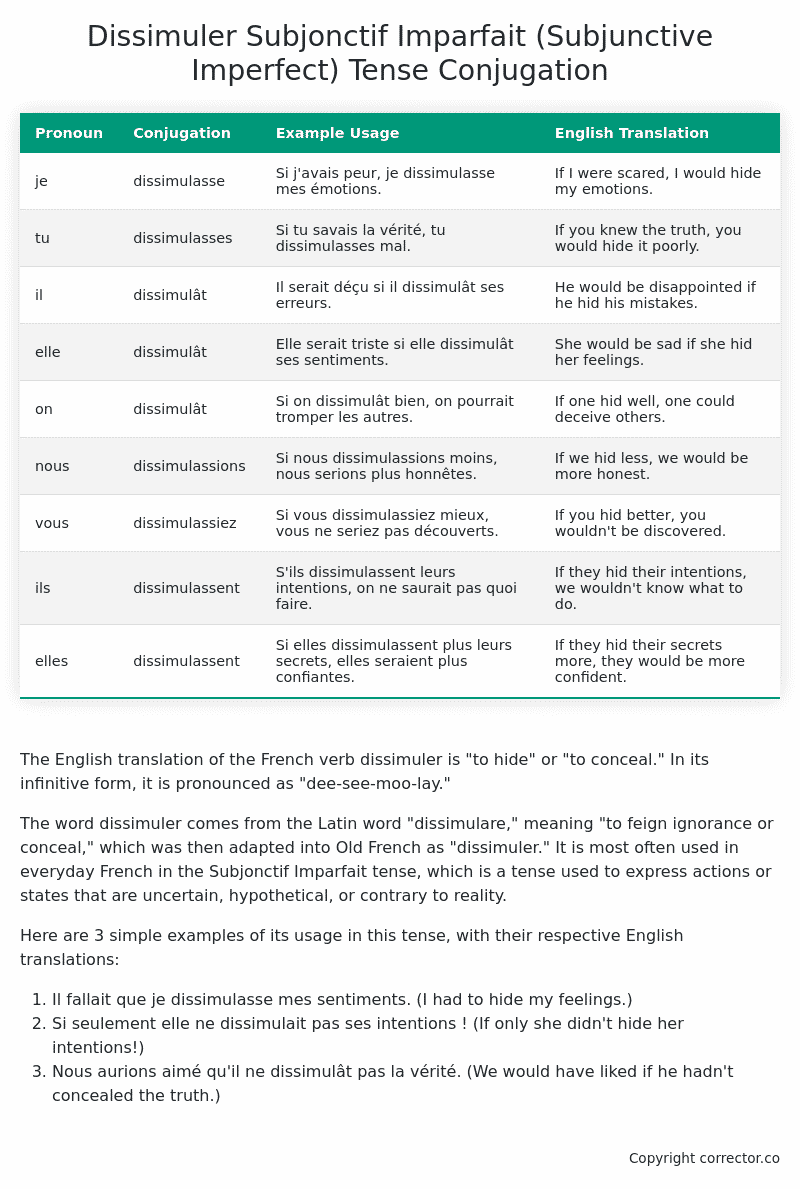Subjonctif Imparfait (Subjunctive Imperfect) Tense Conjugation of the French Verb dissimuler
Introduction to the verb dissimuler
The English translation of the French verb dissimuler is “to hide” or “to conceal.” In its infinitive form, it is pronounced as “dee-see-moo-lay.”
The word dissimuler comes from the Latin word “dissimulare,” meaning “to feign ignorance or conceal,” which was then adapted into Old French as “dissimuler.” It is most often used in everyday French in the Subjonctif Imparfait tense, which is a tense used to express actions or states that are uncertain, hypothetical, or contrary to reality.
Here are 3 simple examples of its usage in this tense, with their respective English translations:
- Il fallait que je dissimulasse mes sentiments. (I had to hide my feelings.)
- Si seulement elle ne dissimulait pas ses intentions ! (If only she didn’t hide her intentions!)
- Nous aurions aimé qu’il ne dissimulât pas la vérité. (We would have liked if he hadn’t concealed the truth.)
Table of the Subjonctif Imparfait (Subjunctive Imperfect) Tense Conjugation of dissimuler
| Pronoun | Conjugation | Example Usage | English Translation |
|---|---|---|---|
| je | dissimulasse | Si j’avais peur, je dissimulasse mes émotions. | If I were scared, I would hide my emotions. |
| tu | dissimulasses | Si tu savais la vérité, tu dissimulasses mal. | If you knew the truth, you would hide it poorly. |
| il | dissimulât | Il serait déçu si il dissimulât ses erreurs. | He would be disappointed if he hid his mistakes. |
| elle | dissimulât | Elle serait triste si elle dissimulât ses sentiments. | She would be sad if she hid her feelings. |
| on | dissimulât | Si on dissimulât bien, on pourrait tromper les autres. | If one hid well, one could deceive others. |
| nous | dissimulassions | Si nous dissimulassions moins, nous serions plus honnêtes. | If we hid less, we would be more honest. |
| vous | dissimulassiez | Si vous dissimulassiez mieux, vous ne seriez pas découverts. | If you hid better, you wouldn’t be discovered. |
| ils | dissimulassent | S’ils dissimulassent leurs intentions, on ne saurait pas quoi faire. | If they hid their intentions, we wouldn’t know what to do. |
| elles | dissimulassent | Si elles dissimulassent plus leurs secrets, elles seraient plus confiantes. | If they hid their secrets more, they would be more confident. |
Other Conjugations for Dissimuler.
Le Present (Present Tense) Conjugation of the French Verb dissimuler
Imparfait (Imperfect) Tense Conjugation of the French Verb dissimuler
Passé Simple (Simple Past) Tense Conjugation of the French Verb dissimuler
Passé Composé (Present Perfect) Tense Conjugation of the French Verb dissimuler
Futur Simple (Simple Future) Tense Conjugation of the French Verb dissimuler
Futur Proche (Near Future) Tense Conjugation of the French Verb dissimuler
Plus-que-parfait (Pluperfect) Tense Conjugation of the French Verb dissimuler
Passé Antérieur (Past Anterior) Tense Conjugation of the French Verb dissimuler
Futur Antérieur (Future Anterior) Tense Conjugation of the French Verb dissimuler
Subjonctif Présent (Subjunctive Present) Tense Conjugation of the French Verb dissimuler
Subjonctif Passé (Subjunctive Past) Tense Conjugation of the French Verb dissimuler
Subjonctif Imparfait (Subjunctive Imperfect) Tense Conjugation of the French Verb dissimuler (this article)
Subjonctif Plus-que-parfait (Subjunctive Pluperfect) Tense Conjugation of the French Verb dissimuler
Conditionnel Présent (Conditional Present) Tense Conjugation of the French Verb dissimuler
Conditionnel Passé (Conditional Past) Tense Conjugation of the French Verb dissimuler
L’impératif Présent (Imperative Present) Tense Conjugation of the French Verb dissimuler
L’infinitif Présent (Infinitive Present) Tense Conjugation of the French Verb dissimuler
Struggling with French verbs or the language in general? Why not use our free French Grammar Checker – no registration required!
Get a FREE Download Study Sheet of this Conjugation 🔥
Simply right click the image below, click “save image” and get your free reference for the dissimuler Subjonctif Imparfait tense conjugation!

Dissimuler – About the French Subjonctif Imparfait (Subjunctive Imperfect) Tense
Formation
Common Everyday Usage Patterns
Interactions with Other Tenses
Subjonctif Présent
Indicatif Passé Composé
Conditional
Conditional Perfect
Summary
I hope you enjoyed this article on the verb dissimuler. Still in a learning mood? Check out another TOTALLY random French verb conjugation!


